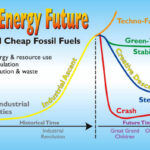Framework from the New Economics Foundation
The UK’s New Economics Foundation issued a publication called “The Great Transition” about the transformation of economics. While I’m not impressed with the detailed content, I do like the table of contents, which outlines a list of 7 or so ways we’ll need to reorient our economic thinking and our economic systems to become more sustainable. As I said in Part I, “stimulus”, “green jobs” and a change in political representatives cannot fix the root of the problem: the descent from 5-planets’-worth-of-consumption. The task before us is to ease the suffering of change as we segue and adapt through the descent. Meanwhile, we must remain conscious that we are setting in place the rudiments of what will become the new economy.
NEF presents each of their ideas in terms of government-level policymaking. Given the profound insights of Speth, particularly with regards to the political-economic situation here in the U.S., I think it is highly unlikely that we will see government-level policymaking like NEF advocates for the UK. However I began to view the NEF list quite differently: as a collection of issues we should consider at the local level as we build a more resilient economic system from the ground up.
The NEF list offers a guiding “blueprint” for us shovel‑wielders as we get into action within our local communities.
“The Great Reskilling” and “The Great Localization are already spreading throughout progressive circles. With urban homesteading, Buy Local campaigns, large-scale urban farming such as in Detroit, these ideas are even filtering into mainstream acceptability. The NEF document reminds us that they are essential parts of a much broader panorama of economic solutions.
· Transition Ingredients “The Great Reskilling”, Understanding Scale, “Strategic Local infrastructure” and more
As we pursue Relocalization, I hope that we won’t neglect some of the ideas from the Mander book:
· the language of the land (Jeanette Armstrong, “Sharing One Skin”) In the Okanagan view so lyrically shared by Armstrong, self and place become intertwined to such extent that it becomes difficult to define self without including place.
· local place-centric education (Norbert-Hodge). Norbert-Hodge questions the current one-size-fits-all concept of what constitutes “education,” advocating instead for training in locally adapted agriculture, architecture, artisan production, and appropriate technologies suited to the specifics of climate and local resources. It sounds a whole lot like Permaculture‑inspired education; Norberg-Hodge proposes this become the curriculum for the mainstream.
“The Great Revaluing” describes necessary shifts in our values — inner shifts, so that we begin to view things which are good for the environment and good for human survival as economically valuable. This topic heading might include everything from the plentiful ideas in Speth’s “Consumerism” chapter, to the four quadrants of Jackson’s TED talk, to the elegant and meaningful Change In Consciousness of Joanna Macy [page reference].
Within our local communities we can help promote value shifts by using tools like Resilience Indicators (Practical Tool 7, [page reference]) and alternative financial vehicles (Practical Tool 5, [page reference]). We can design Resilience Indicators which encourage resource consciousness, powerdown practices and carbon reduction. We can hold these new Indicators up as a scorecard within our neighborhoods, which can begin to infuse this values shift into the local business community and into the wider population. We can use carefully designed local currencies and time banks to cultivate a Revaluing of the local, and to overcome some of our social injustice issues.
In a very different way, Eisenstein’s gift culture also helps achieve The Great Revaluation. When the goods changing hands are no longer fungible mass-produced objects — when they are instead infused with meaning by their uniqueness, by the stories and sentimentality they carry with them, and by connection with the giver — new values are born.
I think The Great Revaluing is much more likely to happen bottom-up, to be generated by grassroots efforts. Let’s return to the useful term “decoupling” (think of a train car disconnecting from the main train), I think it is very possible that in the medium-term we may see a Relocalization‑driven decoupling, where our local economies become much more self-sufficient – to the point of detaching from the overall system. The macro-level economy will probably continue spiraling in upon itself in its internally-rotted form, while local economies “decouple” and begin to redefine themselves in much healthier, wiser, vital new ways.
“THE GREAT REBALANCING” is about the balance between control and freedom. Economists write about it in terms of “market regulation” versus “free-market/laissez-faire.” The NEF document gives a fairly good, plain‑English explanation using sports terminology: We prepare the playing field, the players run out onto the field, and we need clear “rules of the game” to guide whether the game is played fairly.
The problem of course is how to go from here to there: how to achieve the transition from the corporate lobbyists and campaign-favor-driven system we currently have, to that lofty ideal of a fair playing field with clear rules of the game such that corporate profiteering can’t overtake democracy. On how we might achieve this journey, NEF is silent.
Without legislation and regulation abilities, we are left high and dry without any enforcement abilities. The Great Rebalancing simply will not occur without changes in the laws that define “the rules of the game.”
In the UK, Hopkins has proposed a Transition Enabling Act. Whether it is timely or appropriate for the UK I cannot judge, but my feeling is that such an Act would probably be far premature here in the U.S. And because of our legal structure, such an Act would be inappropriate at the federal level; it would be most potent at the individual states level. (Why? Because the Dillon Rule could override local attempts.)
At a local level, fragmented baby-step legislation does exist: Arcata, CA declared an end to corporate personhood; several U.S. cities have held out against formula restaurants or chain stores; and the cities of Portland, OR, Ventura, CA, and San Francisco, CA have each officially acknowledged the necessity of peak oil preparedness. Speth dismisses these as “largely symbolic,” and speaking for today, Speth is technically correct. But I believe these local steps hold long-term importance, and Transition initiatives should continue the effort to get appropriate local measures in place.
I see two ways the “new rules of the game” could come about:
1. working within the political system (Speth’s way), or
2. by default via the crumbling of the globalized economy and Relocalization-driven decoupling.
The comments of Speth and his quotations of Barnes leave me with little hope that we will see real, adequate, and meaningful politically generated solutions. In the words of the Transition movement’s Cheerful Disclaimer [page reference], these will likely be “too little, too late.” Thus I regret to say we are left with the “by default” method.
Imagining one potential scenario in which The Great Rebalancing might come about: As the broader economy we know today begins to come apart, our local communities will find all their self-sufficiency and resilience-building prep work pays off as they’re doing quite a bit of fending for themselves. At this point, the once “largely symbolic” local proclamations become quite significant: they become the rules of the new, local game.
“The Great Redistribution” begins with the basic concept that wealth distribution is out of line. Here in the U.S. wealth inequality is worsening, and recent studies demonstrate that most Americans think the distribution should be far more equitable. We yearn for it, yet we are headed in the opposite direction.
The NEF report proposes achieving wealth redistribution by using taxes as the primary vehicle. Here in the U.S. I think that is extremely unlikely to occur due to the stranglehold that the wealthy elite have upon the overall political system. The kind of policy shift that is inherent in this proposal is fairly unrealistic at this point in time. But I believe that considerable Redistribution may happen anyway, without political intervention, in the natural course of things. More on this in a minute.
The NEF report also observes that “a society in which all have a real stake is about much more than financial assets.” It goes on to discuss redistribution of voice, and of work and time. At a grassroots level, the Transition approach offers real, functional solutions to these issues.
Within a Transition community, the dynamic we are creating with Open Space discussions, Council Circles, and other social tools gives many people a voice. (see Transition ingredient “Community Brainstorming Tools”). Tools like these help (in the words of Hopkins) to “unleash the creative genius of communities to respond brilliantly to times of great challenge.” Viewing these “people skills” techniques as an integral part of an economics solution represents a very significant cultural shift!
A different sort of “Great Redistribution” — different than NEF envisioned — may occur via the very latest developments among the veteran Transition communities. These newest developments include explorations of Community Supported Agriculture/Farms/Bakeries, community ownership of assets, social enterprise and other forms of Community-based investment (Practical Tool #6, [page reference]). Couple these with Transition community efforts to engage landowners, local businesses, and schools, and the rudiments of a vast shift begin to emerge. These new directions represent a solid foundation for The Great Redistribution.
We cannot be sure exactly how the economic contraction will unfold. I recall a video (perhaps it was “In Transition” although I’m unable to find it right now) which depicted the path of energy descent with a cartoon character in a roller coaster car. His ride was far from the nice smooth descent of Holmgren’s curve. Instead, the path of energy descent included loop-the-loops, wild dips and plunges, and occasional brief ascents.
Is this collapse? Your determination will probably depend upon where you are standing and how much of your personal stake is caught up in the roller coaster plunges. Yet the term “collapse” to me implies unrestrained chaos. The Transition movement is an effort to consciously design our descent from the energy pinnacle. I do believe that the “surge breakers” that the Transition movement works toward – in food supply, water supply, economics, and more — stand a solid possibility of staving off unrestrained chaos … if we can get them in place in time.
As all the intricacies of peak oil, climate change, and peak everything unfold, in my opinion we are very likely to see a dramatic shakedown. The few, the wealthy, who currently hold so many assets and so much power, do so within the current system – which is inextricably built upon cheap oil, globalized transactions, and continued growth. Remember how the Crash of 1929 and the Depression of the 1930s caused a massive shakedown and reallocation of wealth: those who entered with money and power in many cases weren’t the ones who afterward emerged with it.
As the cornerstones to the wealth of today’s power elite dissolve to nothingness in their hands, I believe we, the people in the trenches with “shovels” in our hands, hold enormous potential to re-craft things like asset distribution, democratic voice, and lifestyle pace in a vastly different way. Jackson’s TED talk, Speth’s assemblage, Norbert-Hodge’s printed essay, Eisenstein’s non-monetary ideas, and the NEF table of contents offer some fascinating points to fold into our visions as we undertake that re-crafting project. Returning to Jackson’s phrase, it’s up to us to build local resilience through collapse.
83% of Americans say society is not focused on the right priorities;
81% say America is too focused on shopping and spending;
88% say American society is too materialistic;
74% believe excessive materialism is causing harm to the environment.
If these numbers are anywhere near correct, there is a powerful base on which to build.–James Gustave Speth
Download a table of how the NEF Framework (Great Reskilling, Great Revaluing, etc.) can be brought about by building Economic Resilience (Practical Steps from Part III). Note: GoogleDoc, loads slowly.


